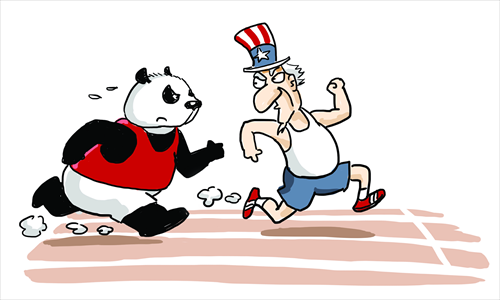Gradually reducing Sino-US mistrust in best interests of all involved

Illustration: Liu Rui/GT
The source of strategic mistrust between China and the US is long-standing. It can be traced back to over four decades ago when the two resumed diplomatic ties.
From the three China-US joint communiqués that laid the foundation for Sino-US relations, we can see that on some key issues, the two countries only agreed to allow disagreements to exist but they had no intention or were unable to solve these disagreements.
Nonetheless, in the then strategic environment, their eagerness to communicate far exceeded the willingness to solve disagreements. That's why at that time or even in the following decades, the strategic mistrust between the two has not been truly felt.
In fact, mistrust at different levels has always existed in the communication process between China and the US. With the rise of China, both remain doubtful over whether the other supports its long-term development trajectories. The strategic impact of such mistrust has been expanding and brought consequences that cannot be neglected to Sino-US ties and even the whole world.
As time goes by, the current Sino-US relationship has become one between a newly emerging power and an existing hegemon. From the perspective of international relations, such a relationship is full of uncertainties and conflicts.
With the strength gap between the two diminishing, the insecure sense of both has intensified: China worries that the US will contain its development, while the US is concerned that China will challenge the existing international rules and thus replace the US, which the US as the rule-maker and the beneficiary will never allow to happen.
Under such logic, both can easily see the other's policy as malicious containment or aggression which aims to change the current situation.
Meanwhile, the differences and incomprehension on political traditions, value systems and culture haven't decreased due to their diminishing power gap. Instead, they are often used as opinion weapons to criticize the other. The irrationality of the public and media has also ignited unprecedented nationalism.
Therefore, although the two countries hold strategic dialogues constantly and know each other's stance on important matters, a mature communication channel has failed to make the two reach a historical consensus, nor does it build up trust between the two powers.
By contrast, the deepening discrepancies in ideology, economy, military and environment pave the way for deeper strategic mistrust between the two.
To ease the mistrust and redefine Sino-US relations, both have made more pragmatic efforts. Establishing a new type of major power relationship is one of these.
This proposal aims to break the negative fatalism that predicts inevitable conflicts between an emerging power and an existing hegemon. It also seeks a way that benefits both sides and the world.
The minimum requirement for this relationship is "no confrontation and no conflicts." Both sides should target frankness and mutual respect.
There's a long way to go before China and the US could eliminate strategic mistrust and build up strategic trust. The current mistrust between the two doesn't necessarily mean they could not reach certain understandings in important issues. Even if they cannot cooperate, a sense of security toward the power and intention of the other can be established.
In the future, the importance of Sino-US relations will increase. As the two biggest world economies, the policies of the two governments will stretch beyond their boundaries. Both should bear the responsibility of establishing a model of competition and interaction between great powers that is stable, sustainable and controllable.
The author is a research fellow at the Institute of International Relations, Shanghai Academy of Social Sciences. opinion@globaltimes.com.cn